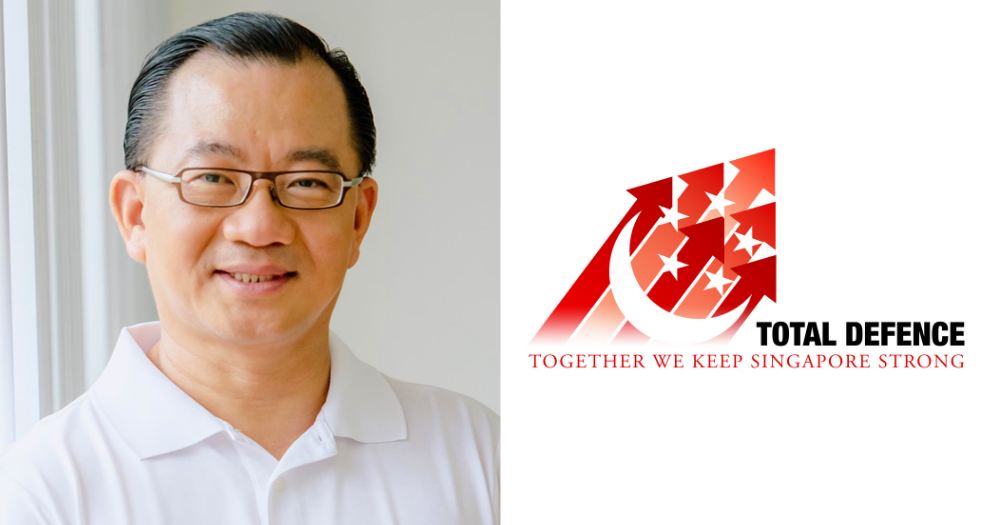Follow us on Telegram for the latest updates: https://t.me/mothershipsg
Singapore's Total Defence comprises six pillars: military, civil, economic, social, digital and psychological defence.
Responding to a motion by Member of Parliament (MP) Louis Ng in Parliament on Monday (Feb. 1), MP Seah Kian Peng called for climate defence to be added to the list, as the seventh pillar of Total Defence.
People disregard cost of non-compliance because it doesn't affect them
Seah, who previously called for climate defence to be added to Total Defence during the 2020 Budget Committee of Supply debates, compared people's attitudes toward climate change to Covid-19 public health issues.
He pointed out how public health requires collective action — for everyone to play their part, so that everyone benefits.
But some people disregard the costs and don't comply to health measures, because they believe they won't be the ones paying. Therefore, public health problems require strong regulatory intervention and social pressure, Seah said.
Similarly, the environment needs collective action, as the cost of inaction is only felt several generations later.
"The price too is high but paid in generations, so each one does not think of the final tally.
The harm too is great, but borne unevenly – so that even as some die because of air pollution, others live in air-conditioned comfort. And so, power and justice come apart."
To emphasise the importance of the environment to Singapore's national security, Seah laid out three reasons for adding climate defence to the Total Defence pillars.
Climate change and effects pose high-risk threats to Singaporeans
Climate change and its associated affects like rising sea levels pose clear threats to Singaporeans, said Seah.
He cited Prime Minister Lee Hsien Loong's 2019 National Day Rally speech, in which he said, "[w]e should treat climate change defences like we treat the SAF — with utmost seriousness".
Low salience
Another reason is to "give [climate change] priority and urgency".
Unlike other threats such as terrorism, war, and the Covid-19 pandemic, climate change and environmental disasters do not have high salience, as they are not particularly noticeable or prominent.
Together with high blame avoidance and little chance to claim credit, this low salience of climate change in people's minds makes the issue a "perfect storm".
People may feel that their own efforts will not create any change, which means the issue is not in the forefront of their minds. By adding climate defence as the seventh pillar, it is placed on the same pedestal as other threats.
Defence against something we can all fix
The third reason is that, unlike the other pillars, it is not a defence against any specific threat, but rather against unavoidable environmental degradation that everyone can play their part in fixing.
He advocated for people to commit to individual actions that can add up to become substantial contributions in Singapore's fight against climate change, rather than solely relying on the government.
One way is by reducing individual consumption and wastage, such as making a conscious effort to reduce food waste and plastic waste.
Seah encouraged individuals to set their own environmental targets and to evaluate whether their lifestyles have achieved what they aimed to do.
A common perception, he said, is that because Singapore is a small country, any action taken will not have a significant effect on climate change.
"But, if every country thinks this way, then nothing will be done."
By adopting climate defence, it "demonstrates that Singapore is a responsible member of the international community with regards to climate change and can be trusted to adhere to the goals set under the Paris Climate Agreement."
As the seventh pillar, climate defence then becomes a more organised, deliberate, and strategic approach by the government to its climate adaptation and mitigation policies.
Education as a way to create long-term change
In order to facilitate and inculcate long-term behavioural change, there must be a focus on education and promoting sustainable behaviour, Seah said.
The idea of stewardship can be enhanced by fostering the idea of a connection to the environment in the youth, especially the 3Rs — reduce, reuse, and recycle.
Seah recognised the work by Ng and his team on the issues of climate change and environmentalism, and warned against making climate defence the "old 'green' message in new bottles":
"Aside from behavioural nudges, there must be resolution towards new laws and regulations.
There must be a willingness to make the market work for the environment.
There must be more will, more attention, and more resources."
Read more:
Totally unrelated but follow and listen to our podcast here
Top photo via Facebook / Sea Kian Peng and SCDF website.
If you like what you read, follow us on Facebook, Instagram, Twitter and Telegram to get the latest updates.
